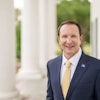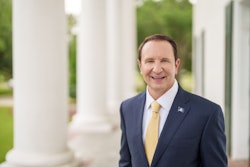HBCUs Strategize on Ways to Close Digital Divide on Their Campuses
Slow adoption of technology by faculty seen as barrier
ATLANTA
With Black colleges positioning their institutions to tackle the digital divide, officials with Tennessee State University and Clark Atlanta University highlighted an array of issues and strategies aimed at reducing the information technology gap between the information-rich and the information-poor during back-to-back conferences here last month.
Even though the conferences focused on the same topic, one meeting highlighted the technology divide between HBCUs and other higher education institutions while the other showcased programs available to minority institutions seeking to address the racial and economic disparity in technology ownership and access in the United States. Both meetings were held at the Omni Hotel/CNN Center in downtown Atlanta.
With support from the America Online Foundation, Tennessee State University officials conducted a two-day focus group-oriented event that examined how Black institutions could catch up to majority White institutions in terms of resources and productive use of IT. Dr. Eugene Jones, the TSU-AOL co-project manager, moderated the sessions, which attracted 67 attendees, including college presidents from Tennessee State University, Rust College, Paul Quinn College, North Carolina A&T State University and Bennett College. Two students from Tennessee State University also attended and served as panelists.
“The solution of the digital divide is in this room,” Jones told participants.
“The digital divide is our divide. It surfaces in our underserved students who are arriving from high schools and homes where they’ve not had access to technology,” declared Dr. James Hefner, president of Tennessee State University.
Even though Jones presented a time line and historical analysis of IT development since 1985, showing HBCUs to be unprepared to properly finance IT development since the mid-1990s, several participants zeroed in on the culture of Black institutions as a potentially more inhibiting factor than poor finances in the HBCU technology lag.
“The digital divide is about the culture of an organization or a community. It’s not about the technology. It’s about access to information and placing value on that information,” says Ramon Harris, executive director of the Executive Leadership Foundation’s Technology Transfer Project. The foundation, which is an outreach organization representing leading Black executives at Fortune 500 companies, conducts the Technology Transfer Project as a consulting initiative that assists Black institutions with IT development.
Discussions, which took place among the participants as group discussions with expert panelists, allowed for frank and candid comment. Slow adoption of technology by faculty, inefficient fiscal and operations management of HBCUs and lack of student exposure to IT were cited as barriers to effective deployment and use of IT on Black campuses.
Jones announced that the Atlanta meeting would be the first of several to be underwritten by the AOL Foundation.
The goal of the sessions are for participants to devise concrete strategies that will help the HBCU community solve their digital divide.
Coinciding with the TSU-AOL meeting, Clark Atlanta University officials convened the second annual HBCU/MI Educational Technology Expo, which drew more than 300 participants. While many of the sessions and discussions focused on what HBCU officials could do to alleviate technology gaps at their campuses, the conference highlighted initiatives aimed at tackling the digital divide in the broader society.
Keynote speakers included Robert L. Mallett, deputy secretary of the U.S. Department of Commerce; Atlanta Mayor Bill Campbell; Darien Dash, CEO of DME Interactive Holdings; and B. Keith Fulton, director of the AOL Foundation. Dr. O. Diane Bowles, who is director of the Videoconferencing Training, Research and Education Center at Clark Atlanta University, served as conference chair.
Highlighted initiatives, which involved colleges and universities working with community groups, businesses, health organizations and government, featured sessions on the city of Atlanta’s community technology centers, the Human Genome Project, health technology outreach programs and university-led economic development. A town hall meeting on health and technology, involving conference participants, was held on the set of CNN’s “Talkback Live” television show.
The conference, through a series of “e-Business” sessions, showcased ways HBCUs could foster economic development through technology transfer programs and sponsoring forums to pair investors and minority business startups. A business plan competition, which featured eight Black-owned technology companies, allowed the entrepreneurs to present their plans to venture capitalists.
“When you look at the development of many major information technology firms, you’re talking about their product and technology development having been subsidized by the government and academia,” says Marcellus Jackson, of Clark Atlanta University. “I’m convinced that we can help foster the growth of Black-owned billion dollar enterprises out of the HBCU community.”
© Copyright 2005 by DiverseEducation.com


















